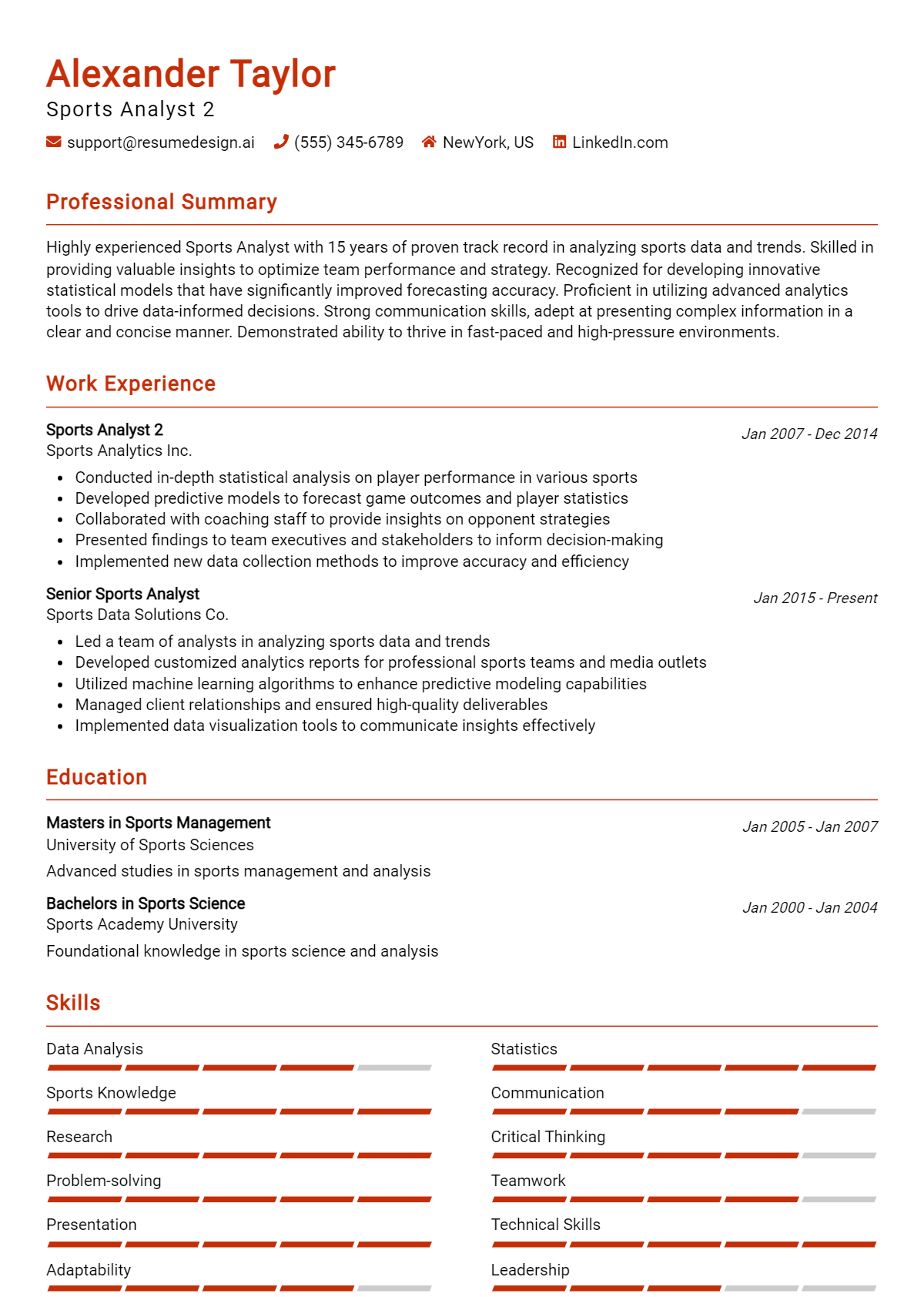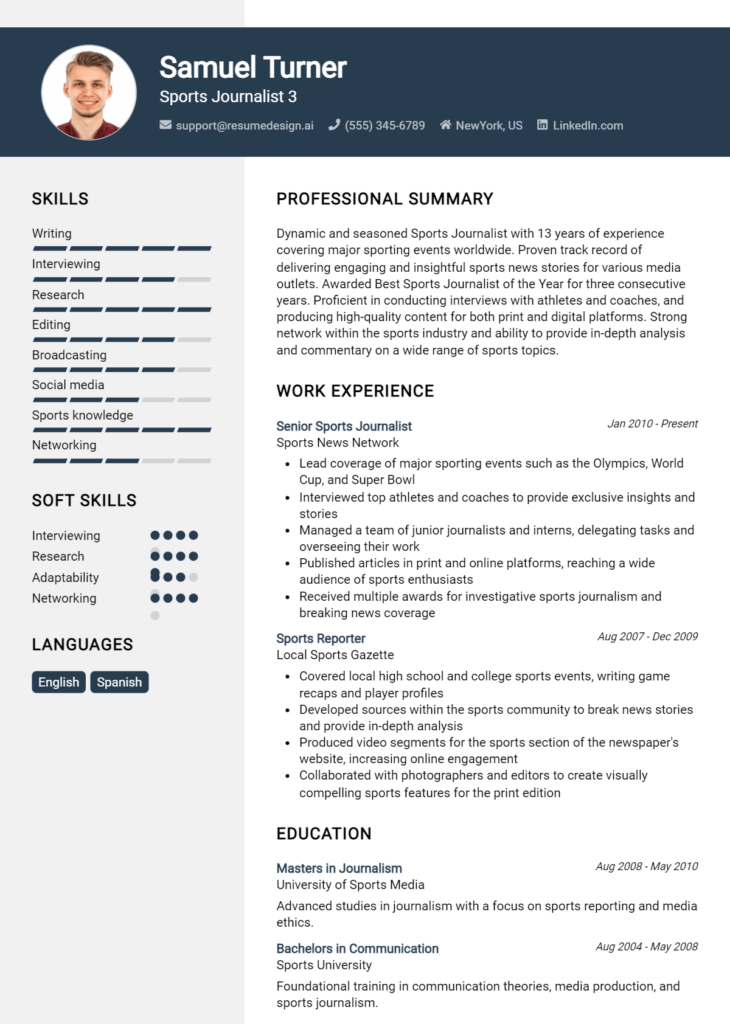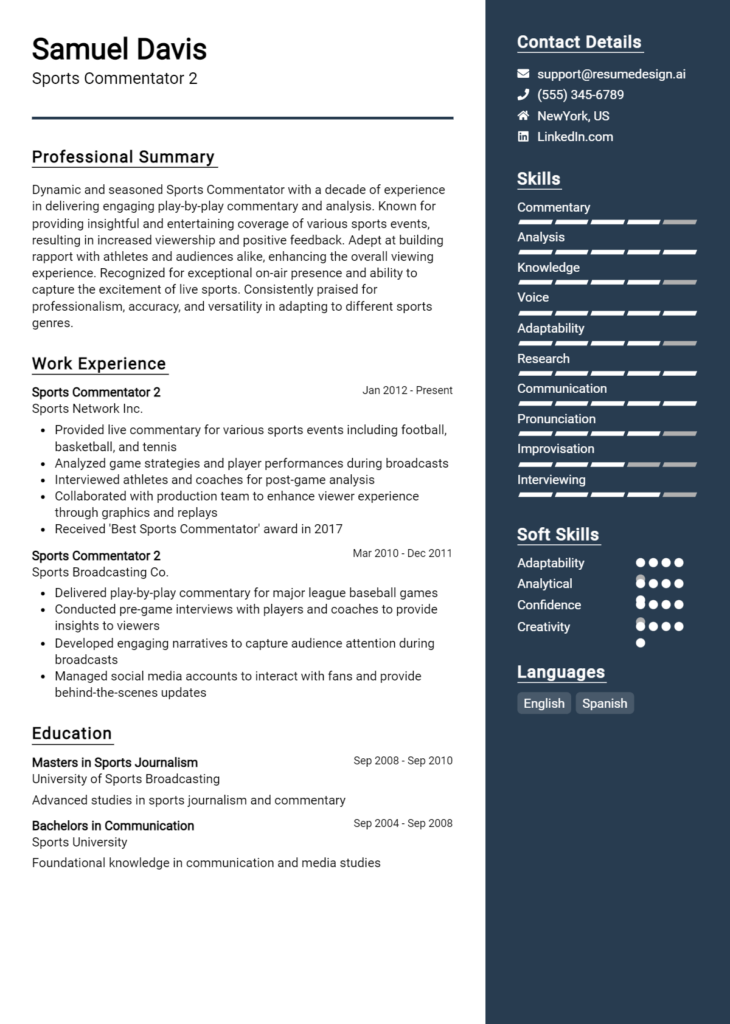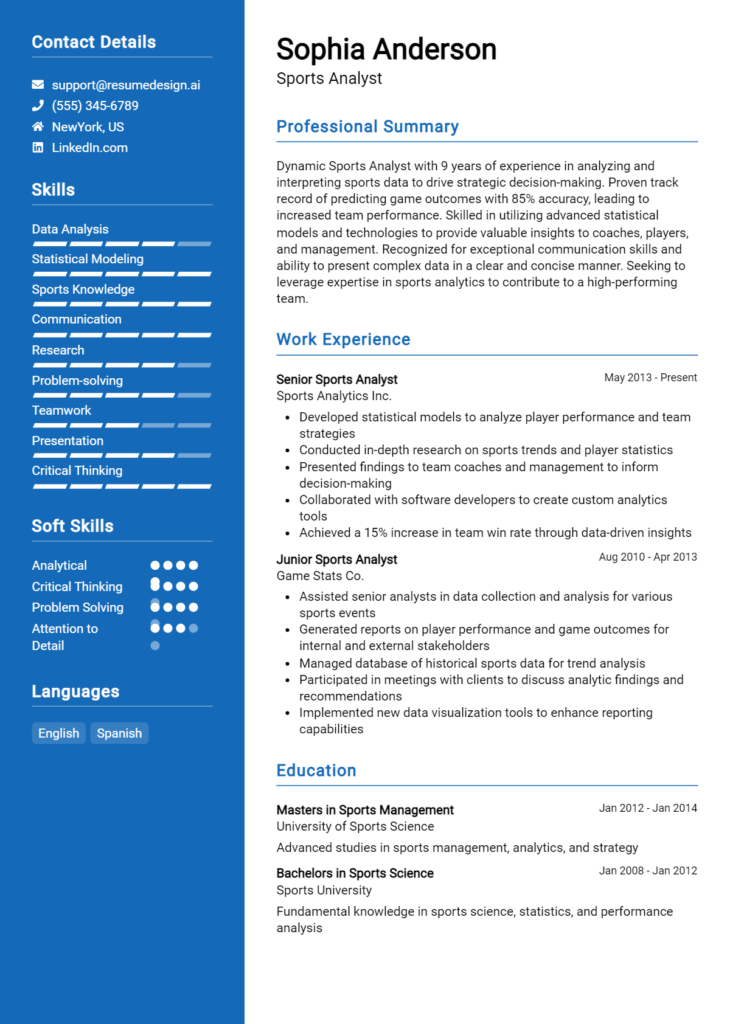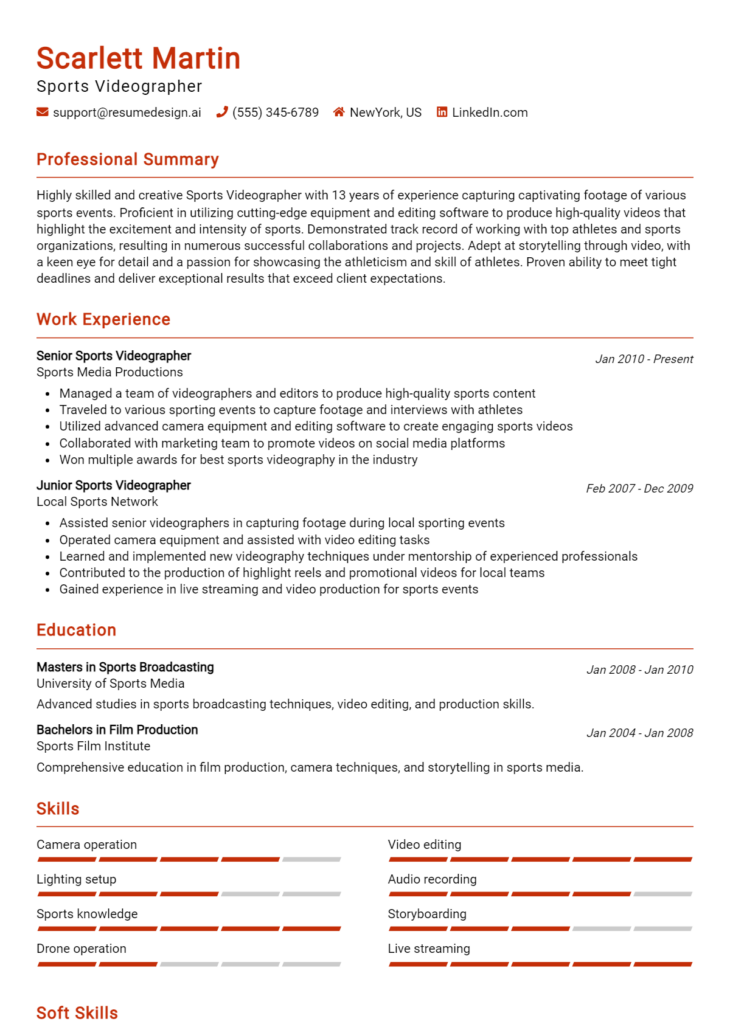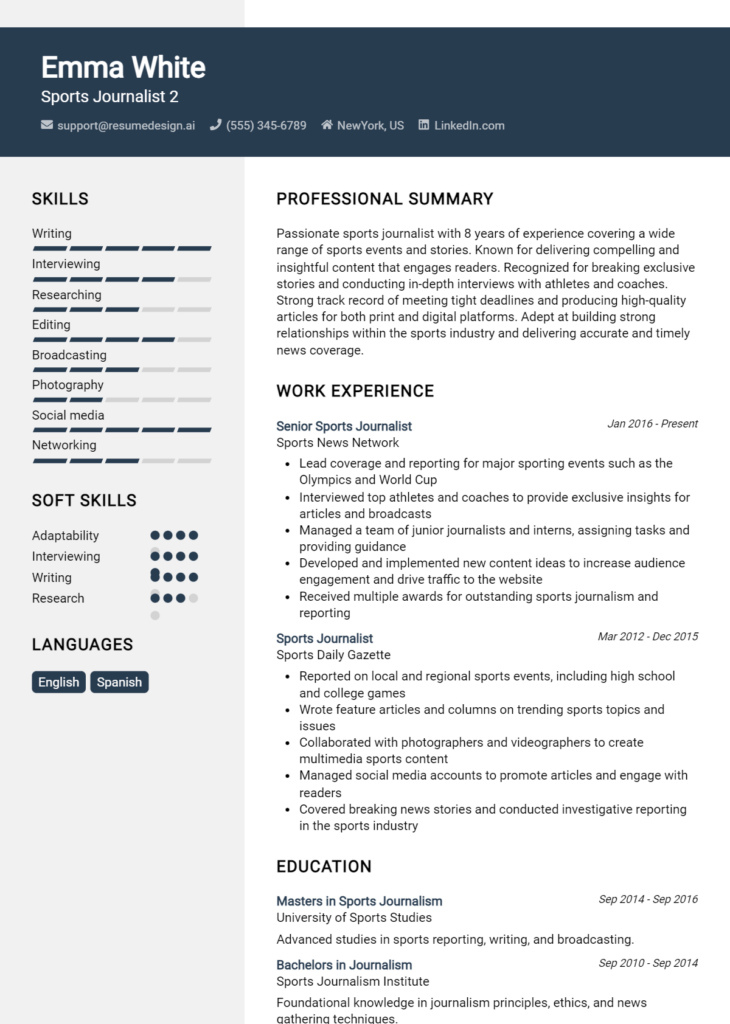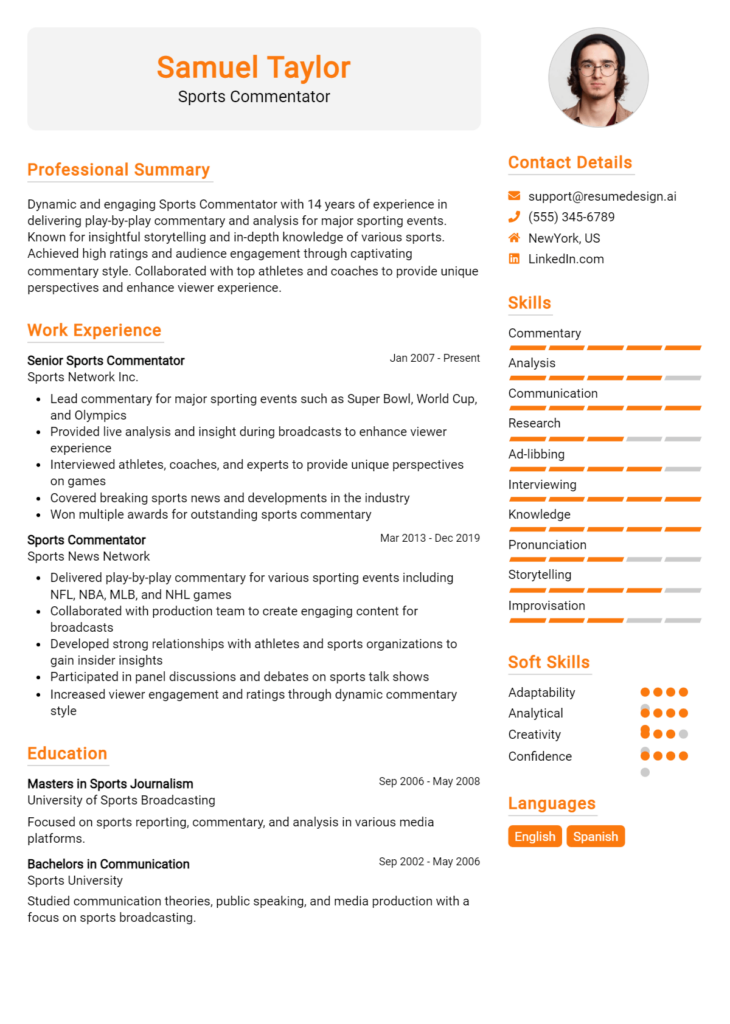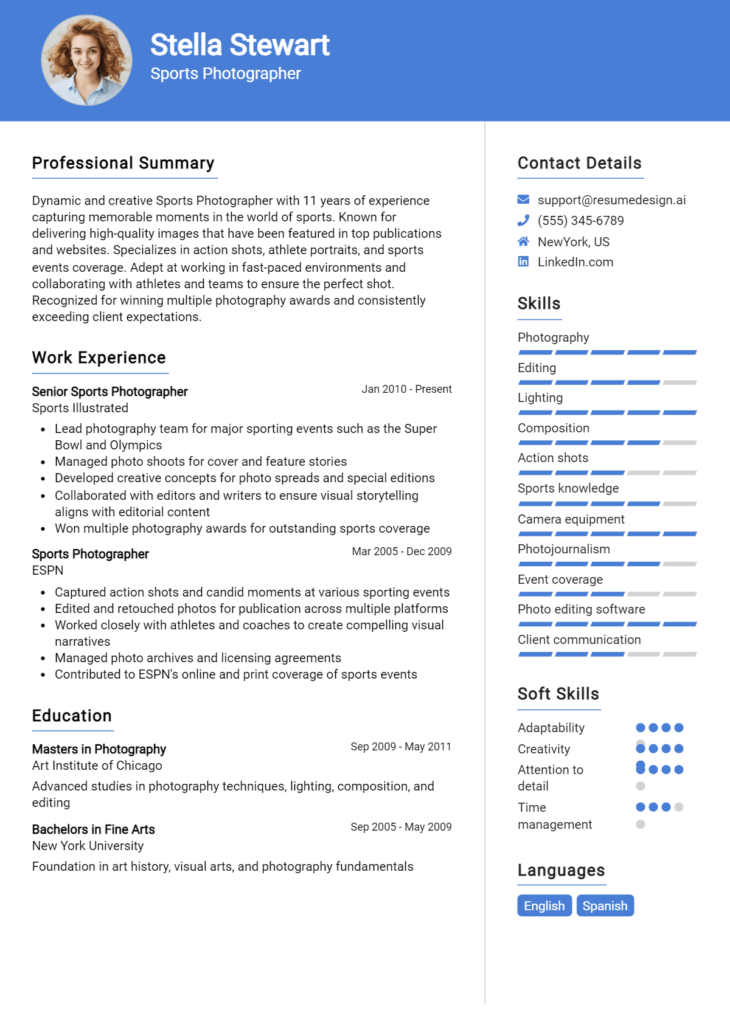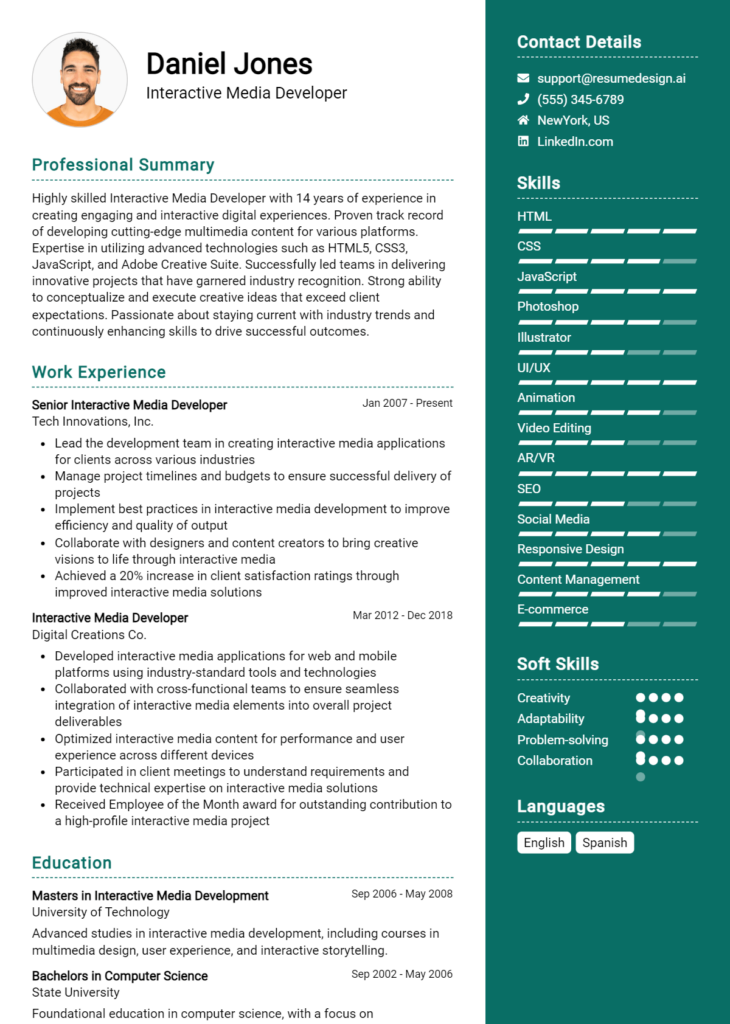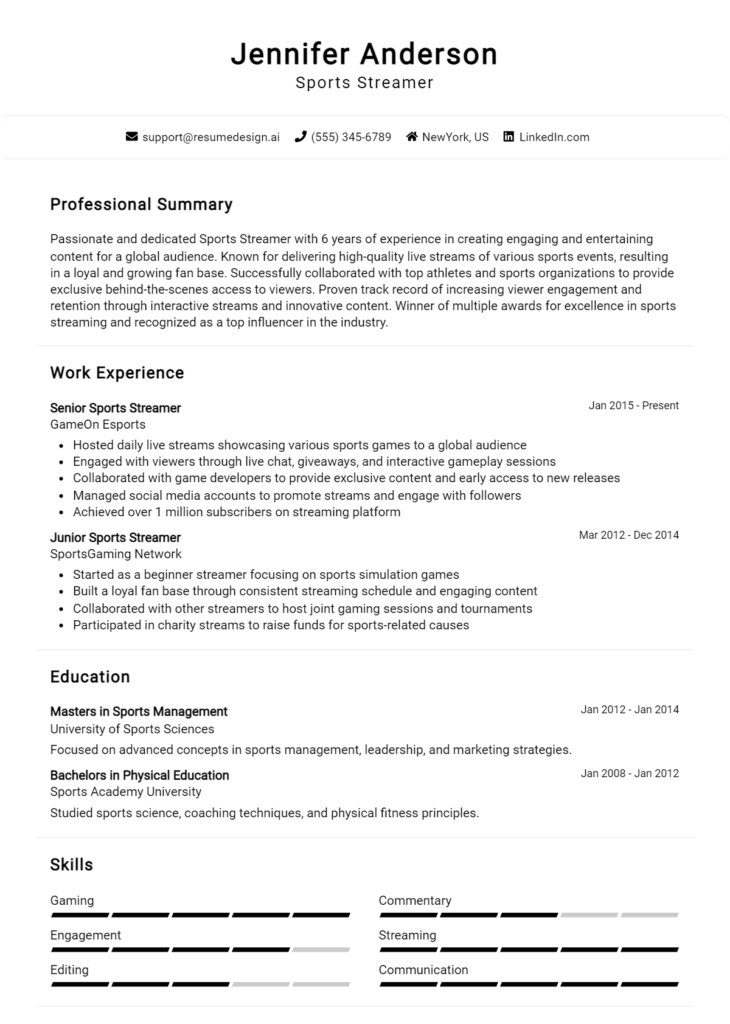Sports Analyst Core Responsibilities
A Sports Analyst plays a crucial role by analyzing performance data, developing strategies, and providing insights that bridge the gap between coaching, management, and marketing departments. Key responsibilities include statistical analysis, trend forecasting, and game strategy development, requiring strong technical skills in data analytics and software tools. Problem-solving abilities are essential for interpreting complex data, ultimately contributing to the organization's competitive edge. A well-structured resume showcasing these qualifications is vital for demonstrating expertise and securing opportunities in this dynamic field.
Common Responsibilities Listed on Sports Analyst Resume
- Conduct in-depth statistical analysis of player and team performance.
- Develop predictive models to forecast game outcomes.
- Collaborate with coaches to design effective game strategies.
- Prepare detailed reports and presentations for stakeholders.
- Analyze opponent strategies and provide recommendations.
- Utilize software tools for data visualization and reporting.
- Monitor player health and performance metrics.
- Stay updated on industry trends and advancements in sports analytics.
- Assist in scouting and recruiting talented players.
- Evaluate and enhance training programs based on data insights.
- Facilitate communication between coaching staff and management.
- Provide analytical support during live games for real-time decision-making.
High-Level Resume Tips for Sports Analyst Professionals
In the competitive world of sports analysis, a well-crafted resume is more than just a list of qualifications; it is often the first impression a candidate makes on potential employers. For aspiring Sports Analysts, this document must effectively communicate not only their skills and experience but also their passion for the industry. A strong resume should reflect a candidate’s unique achievements while aligning closely with the specific demands of the role they are applying for. In this guide, we will provide practical and actionable resume tips specifically tailored for Sports Analyst professionals, helping you to stand out in a crowded field.
Top Resume Tips for Sports Analyst Professionals
- Tailor your resume for each job application by incorporating keywords from the job description to demonstrate alignment with the role.
- Highlight relevant experience, including internships, previous positions, and projects that showcase your analytical skills in sports.
- Quantify your achievements by using metrics or specific data points to illustrate the impact of your work, such as improving team performance or fan engagement.
- Include industry-specific skills, such as proficiency in statistical analysis software, data visualization tools, or knowledge of advanced analytics techniques.
- Organize your resume with clear headings and bullet points, making it easy for hiring managers to skim and find key information quickly.
- Showcase your educational background, including degrees, certifications, and relevant coursework that supports your analytical capabilities in sports.
- Incorporate a summary or objective statement at the top of your resume that succinctly explains your professional goals and what you bring to the table.
- Utilize action verbs to convey your achievements and responsibilities, creating a more dynamic and engaging narrative of your professional journey.
- Include any relevant volunteer work or extracurricular activities that demonstrate your commitment to the sports industry and your analytical skills.
By implementing these tips, Sports Analyst professionals can significantly increase their chances of landing a job in the field. A well-structured and tailored resume not only highlights your qualifications but also conveys your enthusiasm and expertise, making a compelling case for why you should be the chosen candidate. Stand out from the competition and make a lasting impression with a resume that truly reflects your capabilities and potential in sports analysis.
Why Resume Headlines & Titles are Important for Sports Analyst
In the competitive field of sports analysis, a well-crafted resume headline or title is essential for standing out in a crowded job market. A strong headline serves as a powerful first impression, immediately capturing the attention of hiring managers who sift through countless applications. It provides a succinct summary of a candidate's key qualifications and areas of expertise in a single impactful phrase. By being concise, relevant, and directly tied to the job being applied for, a compelling resume headline can effectively set the tone for the rest of the resume, encouraging potential employers to delve deeper into the candidate’s qualifications.
Best Practices for Crafting Resume Headlines for Sports Analyst
- Keep it concise: Aim for a headline that is brief and to the point, ideally no more than 10-15 words.
- Be role-specific: Tailor your headline to highlight your expertise in sports analysis, using relevant industry terminology.
- Highlight key strengths: Focus on your most impressive skills or achievements that align with the job description.
- Use action-oriented language: Employ strong action verbs to convey your impact and contributions to previous roles.
- Include relevant metrics: If possible, quantify your achievements to provide concrete evidence of your capabilities.
- Stay professional: Maintain a formal tone that reflects the seriousness of the role and industry.
- Personalize when necessary: If applying to a specific organization, consider incorporating the company name or values into the headline.
- Avoid clichés: Steer clear of overused phrases that do not add value or insight into your qualifications.
Example Resume Headlines for Sports Analyst
Strong Resume Headlines
Dynamic Sports Analyst with 5+ Years of Experience in Data-Driven Performance Evaluation
Results-Oriented Sports Analyst Specializing in Player Metrics and Game Strategy Optimization
Sports Data Analyst with Proven Track Record in Enhancing Team Performance Through Analytics
Innovative Sports Analyst Skilled in Predictive Modeling and Performance Analytics
Weak Resume Headlines
Sports Analyst Looking for a Job
Experienced Professional in Sports
Analyst Seeking Opportunities in Sports
The strong headlines listed above are effective because they clearly articulate the candidate’s unique strengths, experiences, and areas of specialization that are relevant to the sports analytics field. They use specific language and metrics to convey expertise, making them memorable and engaging. In contrast, the weak headlines fail to impress due to their vague nature and lack of specificity; they do not convey any real value or insight into the candidate’s qualifications, which can lead to them being overlooked by hiring managers in favor of more compelling applicants.
Writing an Exceptional Sports Analyst Resume Summary
A well-crafted resume summary is crucial for a Sports Analyst, as it serves as the first impression on hiring managers who often sift through numerous applications. A strong summary quickly captures their attention by effectively showcasing key skills, relevant experience, and noteworthy accomplishments that align with the job role. It should be concise yet impactful, compelling enough to encourage the reader to delve deeper into the candidate's qualifications. Tailoring the summary to the specific job being applied for is essential, ensuring that it resonates with the expectations of the employer and highlights the candidate's unique value proposition.
Best Practices for Writing a Sports Analyst Resume Summary
- Start with a strong opening statement that captures your professional identity.
- Quantify achievements to demonstrate impact, using specific numbers or percentages.
- Focus on relevant skills that match the job description, such as data analysis or strategic planning.
- Highlight notable accomplishments that illustrate your value in previous roles.
- Keep it concise, ideally 3-5 sentences long, to maintain the reader's attention.
- Use industry-specific terminology to convey familiarity and expertise in sports analysis.
- Tailor each summary for the specific job you are applying for to show genuine interest and fit.
- End with a forward-looking statement that indicates your career goals and enthusiasm for the role.
Example Sports Analyst Resume Summaries
Strong Resume Summaries
Results-driven Sports Analyst with over 5 years of experience in performance metrics and player analysis, increasing team efficiency by 25% through data-driven strategies and targeted training programs.
Detail-oriented Sports Analyst skilled in statistical modeling and predictive analytics, successfully developing a game-winning strategy that led to a 15% increase in win rate for a professional football team in the last season.
Dynamic Sports Analyst with expertise in market trends and fan engagement, having increased social media interaction by 40% through strategic content curation and targeted campaigns.
Dedicated Sports Analyst with a proven track record of enhancing team performance metrics, achieving a 30% reduction in player injuries through comprehensive data analysis and wellness programs.
Weak Resume Summaries
Experienced Sports Analyst who knows a lot about sports and data.
Motivated individual seeking a position in sports analysis with experience in various projects.
The strong resume summaries are considered effective because they provide specific, quantifiable results and directly relate to the skills and experiences relevant to a Sports Analyst role. They highlight achievements that demonstrate a tangible impact on team performance and strategy. In contrast, the weak summaries lack detail and specificity, making them too vague and generic to stand out in a competitive job market. They fail to convey the candidate's unique qualifications or demonstrate a clear understanding of the role's requirements.
Work Experience Section for Sports Analyst Resume
The work experience section of a Sports Analyst resume is crucial as it provides potential employers with insight into the candidate's professional background, showcasing their technical skills, team management abilities, and capacity to deliver high-quality analytical products. This section not only highlights relevant experiences but also emphasizes the importance of quantifying achievements, allowing candidates to demonstrate their impact in previous roles. Aligning this experience with industry standards is essential for making a strong impression and enhancing the candidate's competitiveness in the job market.
Best Practices for Sports Analyst Work Experience
- Focus on quantifiable results, using metrics to demonstrate the impact of your analyses.
- Highlight technical skills relevant to the role, such as data analysis tools and statistical software.
- Showcase collaborative projects that emphasize teamwork and communication with cross-functional groups.
- Use action verbs to convey a proactive approach and leadership in past roles.
- Tailor your experiences to align with the specific requirements of the job you’re applying for.
- Provide context for your achievements to help employers understand the challenges you overcame.
- Include internships or volunteer positions that relate to sports analysis, showcasing a commitment to the field.
- Keep descriptions concise and focused, ensuring clarity and readability of your accomplishments.
Example Work Experiences for Sports Analyst
Strong Experiences
- Developed predictive models that improved player performance evaluations by 30%, leading to optimized recruitment strategies for the team.
- Led a cross-functional team of 5 analysts in a project that analyzed game footage, resulting in a 20% reduction in opponent scoring in the following season.
- Utilized advanced statistical software to analyze player data, contributing to a 15% increase in team efficiency metrics over two seasons.
- Presented detailed game analyses to coaching staff, directly influencing strategic decisions that led to a playoff appearance.
Weak Experiences
- Worked on various sports analysis projects without specific details on outcomes or contributions.
- Participated in team meetings and discussions about player performance.
- Assisted with data entry for player statistics and other information.
- Engaged in general research about sports trends and player metrics.
The examples listed as strong experiences provide clear, quantifiable outcomes and demonstrate leadership and collaboration in relevant projects. They showcase the candidate's ability to deliver results and implement strategies that improve team performance. In contrast, the weak experiences lack specific achievements, metrics, and details, making them less impactful and failing to illustrate the candidate's true capabilities in the field of sports analysis.
Education and Certifications Section for Sports Analyst Resume
The education and certifications section of a Sports Analyst resume is crucial for showcasing a candidate’s academic background and professional qualifications. This section not only highlights the degrees earned and relevant coursework completed but also emphasizes any industry-recognized certifications and continuous learning efforts. By providing detailed information on educational achievements and specialized training, candidates can significantly enhance their credibility and demonstrate their alignment with the demands of the job role. In an industry where analytical skills, statistical knowledge, and understanding of sports dynamics are paramount, this section serves as a vital component in presenting a well-rounded and competent applicant.
Best Practices for Sports Analyst Education and Certifications
- Include only relevant degrees and certifications that align with the sports industry.
- List your education in reverse chronological order, starting with the most recent qualification.
- Provide details of relevant coursework that demonstrates analytical and statistical skills.
- Highlight any certifications from recognized organizations, such as the Sports Analytics Association.
- Mention any specialized training programs or workshops attended that relate to sports analysis.
- Keep the descriptions concise yet informative, focusing on achievements and skills gained.
- Consider including GPA if it is impressive and relevant to the position.
- Regularly update this section to reflect ongoing education and new certifications.
Example Education and Certifications for Sports Analyst
Strong Examples
- Bachelor of Science in Sports Management, University of XYZ, 2022
- Master of Science in Data Analytics, University of ABC, 2024
- Certified Sports Data Analyst (CSDA), Sports Analytics Association, 2023
- Relevant Coursework: Advanced Statistics for Sports, Sports Performance Analysis, and Predictive Modeling in Sports.
Weak Examples
- Bachelor of Arts in English Literature, University of DEF, 2019
- Certification in Basic First Aid, Red Cross, 2020
- Online Course: Introduction to Sports, Coursera, 2021
- High School Diploma, Anytown High School, 2016
The strong examples are considered effective because they directly relate to the field of sports analysis, showcasing relevant degrees, industry-recognized certifications, and applicable coursework that highlight the candidate's qualifications. Conversely, the weak examples lack relevance to the sports analysis role, featuring unrelated degrees and certifications that do not demonstrate the necessary skills or knowledge required for the position. This distinction underscores the importance of tailoring the education and certifications section to align with the specific demands of the job role.
Top Skills & Keywords for Sports Analyst Resume
In the competitive field of sports analysis, showcasing the right skills on your resume is essential to stand out among candidates. Employers look for a blend of hard and soft skills that not only demonstrate your technical capabilities but also your ability to collaborate and communicate effectively within a team. A well-crafted resume that highlights these skills can significantly increase your chances of landing an interview. By focusing on both analytical proficiency and interpersonal attributes, you can present yourself as a well-rounded candidate who can contribute to the strategic decisions in sports management, coaching, or team operations.
Top Hard & Soft Skills for Sports Analyst
Soft Skills
- Analytical Thinking
- Problem-Solving
- Communication
- Attention to Detail
- Team Collaboration
- Time Management
- Adaptability
- Critical Thinking
- Creativity
- Leadership
Hard Skills
- Data Analysis
- Statistical Software Proficiency (e.g., R, Python, SAS)
- Sports Performance Metrics
- Research and Reporting
- Familiarity with Sports Analytics Tools (e.g., Tableau, SQL)
- Knowledge of Game Strategies
- Advanced Excel Skills
- Machine Learning Techniques
- Data Visualization
- Forecasting and Predictive Modeling
To further enhance your resume, consider visiting the skills section for additional insights and examples. Don't forget to leverage your work experience to showcase how these skills have been applied in real-world scenarios.
Stand Out with a Winning Sports Analyst Cover Letter
As a dedicated and analytical individual with a passion for sports, I am excited to apply for the Sports Analyst position at [Company Name]. With a strong background in data analysis and an in-depth understanding of various sports, I am confident in my ability to contribute valuable insights that can enhance team performance and inform strategic decisions. My experience in statistical analysis, combined with a keen eye for trends and patterns in sports, positions me uniquely to support your organization's goals.
Throughout my career, I have honed my analytical skills through rigorous data collection and interpretation, utilizing tools such as Python and R to analyze game statistics and player performance metrics. At [Previous Company Name], I successfully developed predictive models that accurately forecasted game outcomes, which not only assisted the coaching staff in making informed decisions but also improved fan engagement through enriched content. My ability to communicate complex data in a clear and concise manner has allowed me to collaborate effectively with coaches, players, and management, ensuring that everyone is aligned with the strategic vision.
Moreover, my passion for sports extends beyond mere analysis; I am an avid follower of various leagues and tournaments, which keeps me informed about the latest trends, player developments, and industry shifts. This enthusiasm, paired with my commitment to continuous learning, enables me to provide innovative insights that can drive your organization forward. I am particularly impressed by [Company Name]'s commitment to utilizing data-driven approaches in analyzing performance, and I am eager to contribute to your ongoing success by leveraging my skills and knowledge in the ever-evolving landscape of sports analytics.
I am excited about the opportunity to join [Company Name] and contribute to your analytical efforts. Thank you for considering my application. I look forward to the possibility of discussing how my skills and experiences align with your team's needs.
Common Mistakes to Avoid in a Sports Analyst Resume
When crafting a resume for a Sports Analyst position, it's crucial to present your skills and experiences effectively. However, many candidates make common mistakes that can undermine the strength of their application. Avoiding these pitfalls will help you stand out in a competitive job market and demonstrate your professionalism and attention to detail. Here are some frequent missteps to watch out for:
Lack of Relevant Keywords: Failing to include industry-specific keywords can cause your resume to be overlooked by applicant tracking systems. Tailor your resume to include terms commonly found in the job description.
Overly Generic Objective Statements: Using a vague objective statement that doesn't relate to the specific role can make your resume blend in with others. Instead, craft a targeted summary that highlights your unique qualifications and career goals.
Ignoring Quantifiable Achievements: Instead of listing duties, focus on concrete accomplishments with measurable outcomes. Use statistics and data to showcase how your analyses have contributed to team success or improved performance.
Poor Formatting and Structure: A cluttered or inconsistent layout can make your resume difficult to read. Opt for a clean design, consistent font choices, and ample white space to enhance readability.
Including Irrelevant Experience: Adding unrelated jobs or experiences can dilute your relevance as a candidate. Focus on positions and skills directly related to sports analysis to keep your resume concise and impactful.
Neglecting to Proofread: Spelling and grammatical errors can create a negative impression, signaling a lack of attention to detail. Always proofread your resume multiple times or ask a peer to review it for errors.
Omitting Soft Skills: Sports analysts need strong communication, problem-solving, and analytical skills. Failing to highlight these attributes can make you seem less qualified, so integrate them into your experience descriptions.
Using Inconsistent Tenses: Switching between past and present tenses can confuse readers. Maintain consistent verb tenses throughout your resume to present a professional image.
Conclusion
As we wrap up our discussion on the pivotal role of a Sports Analyst, it's essential to remember the key aspects that define this profession. Sports Analysts leverage data and statistics to evaluate player performance, team strategies, and overall game trends, providing invaluable insights to coaches, teams, and fans alike. Their ability to interpret complex data sets and present actionable recommendations is crucial in today's data-driven sports landscape.
Whether you're focused on player scouting, game analysis, or performance metrics, having a strong foundation in statistical analysis and a thorough understanding of the sport are vital. Additionally, effective communication skills are necessary to convey findings clearly to stakeholders.
As you consider your career as a Sports Analyst, it's an excellent time to evaluate your resume. Ensure it highlights your analytical skills, relevant experience, and knowledge of sports statistics. To aid you in this process, take advantage of the various resources available:
- Explore resume templates to find a design that showcases your skills effectively.
- Use the resume builder for a step-by-step guide to create a polished and professional resume.
- Review resume examples to inspire your content and structure.
- Don’t forget to craft a compelling cover letter using our cover letter templates to complement your resume.
Now is the perfect moment to refine your resume and position yourself as a competitive candidate in the sports analytics field. Start reviewing your materials today!

